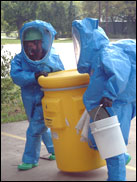Sept. 12, 2023 10 a.m. - 12 p.m.
Welcome to the Collin County Local Emergency Planning Committee website.
Please review the pages below to see what the LEPC is all about and for information that would help you and your family in an emergency.
 The Collin County Local Emergency Planning Committee's mission is to carry out responsibilities required by the Superfund Amendments and Reauthorization Act (SARA) of 1986, Title III by:
The Collin County Local Emergency Planning Committee's mission is to carry out responsibilities required by the Superfund Amendments and Reauthorization Act (SARA) of 1986, Title III by:
- Providing training, testing and advancement of Collin County's Emergency Management Plan
- Collect, manage and provide public access to information on hazardous chemicals in Collin County
- Educate the public about risks from accidental and routine releases of chemicals
Form a partnership between Collin County's municipalities, communities and private entities to enhance hazardous materials awareness and preparedness
In October 1986, Congress enacted the "Emergency Planning and Community Right-To-Know Act" (EPCRA) and "Superfund Amendments Reauthorization Act Title III" (SARA Title III) in direct response to the 1984 Union-Carbide toxic gas release in Bhopal, India. This one incident resulted in thousands of deaths and injuries in the area surrounding the facility. Under United States Code Title 42, the Local Emergency Planning Committee (LEPC) is the organization responsible for development and implementation at the local level of the plans set-forth and required by this legislation.
EPCRA, SARA Title III, and Texas Health & Safety Codes exist to protect and educate the general public. The LEPC's primary charges are to:
- Ensure that residents and workers in Collin County are aware and informed of their right to know what chemicals are being stored, used, released, and discarded.
- Facilitate public requests for information as required by these laws.
EPCRA and SARA Title III also serve business and industry employees as well as first responders (police, firefighters, EMS) by protecting their right to know about chemicals they may be exposed to in the course of performing their jobs.
As an "unfunded mandate" the LEPC has no annual budget and relies on support from its members and grants.
The LEPC believes that "practice makes perfect." First Responder seminars, classes, hands-on training and drills are conducted within the County and on the regional level.
 Federal law requires business and industry operators to perform annual chemical inventories (Tier II Chemical Report) and submit their report to the Texas Department of State Health Services (TDSHS), local Fire Chief and the LEPC no later than March 1 of each year.
Federal law requires business and industry operators to perform annual chemical inventories (Tier II Chemical Report) and submit their report to the Texas Department of State Health Services (TDSHS), local Fire Chief and the LEPC no later than March 1 of each year.
The report (Tier II Chemical Report) is a standardized form, created by the Environmental Protection Agency (EPA), to rate and identify chemicals and hazardous materials. Whether or not a company must file this annual list is determined by the type of chemical and how much is on hand.
Having this information readily available to Fire Departments serves two important purposes:
- Enhances response time to an incident with the right equipment and personnel.
- Immediately alerts first responders whether the public is at risk and advisories are needed.
In the event of a chemical release (spill, leak, emission, gas cloud), a business or industry must report the incident immediately. Texas Health & Safety Codes state a specific timeline for reporting and failure to do so is a violation of both Federal and State law, whether first-responders were dispatched to the scene, or not.
If first-responders are dispatched to a release incident and a Tier II Report is not on file within the jurisdiction, the operator is in violation of the law.
Responding agencies are entitled to recover the costs of securing, containing, and managing the incident.

 The LEPC is an all volunteer organization.
The LEPC is an all volunteer organization.
Sub-committees include: Public Information and Education, Right-To-Know Government and Industry Liaison Emergency Response and Resources, and Executive.
Most of the members live and/or work in Collin County.
Members include:
Allegiance Mobile Health
Bank of America
Baylor Health Care System
Baylor Medical Center Frisco
Bossco Industries Inc.
Celina Fire Department
City of Farmersville
City of McKinney
Finisar Corp
Frisco Fire Department
Fujitsu
Landmark of Plano Rehabilitation & Nursing
Lucas Fire Department
Manner Polymers
North Texas Municipal Water District
Perfomance Food Group
Texas Instruments
 For fun safety and emergency preparedness information for kids visit the Deer Park LEPC at
www.wally.org.
For fun safety and emergency preparedness information for kids visit the Deer Park LEPC at
www.wally.org.
In the event of a reportable release:
- Immediately contact the local Fire Chief where the spill occurred, if within a city's limits. Afterwards,
contact the Fire Marshal, to comply with state reporting requirements.
- If the release occurred in an unincorporated area of Collin County, contact the
Fire Marshal immediately.
Federal and State laws require business and industry operators to perform annual chemical inventories (Tier II Chemical Report) and submit their Tier II Report to the Texas Department of State Health Services (TDSHS), local Fire Chief and the LEPC no later than March 1st of each year.
For more information on Tier II Reporting, Texas Community Right-to-Know and Hazard Communication Acts go to:
Tier II Chemical Reporting Program
Texas Department of State Health Services
The Tier II Chemical Report is a standardized form created by the Environmental Protection Agency (EPA) to rate and identify chemicals and hazardous materials. For the latest information on Tier II Reporting and e-filing, go to:
U.S. Environmental Protection Agency (click on "search" and enter "Tier II")
Whether or not a company must file this annual report is determined by the type of chemical or material and how much is on-site.
Having this information readily available to the Fire Departments serves two important purposes:
- Enhances response time to an incident with the right equipment and personnel.
- Immediate knowledge if the public is at risk and advisories are warranted.
In the event of a chemical release (spill, leak, emission, gas cloud), a business or industry must report the incident immediately. Texas Health & Safety Codes state a specific timeline for reporting; failure to do so is a violation of both Federal and State law whether or not first-responders were dispatched to the scene.
Remember, the responding agencies are entitled to recover the costs of securing, containing, and managing the incident.
TIER 2 Submit
The Collin County LEPC encourages stakeholders to submit their Tier II Reports electronically in .pdf or Microsoft Word document via email. The LEPC also accepts hard copies sent to the mailing address.
The EPA, Collin County Homeland Security, LEPC, and Fire Marshal's Office are working together to enhance first response in Collin County and the neighboring counties in the region.
For detailed information on Tier II reports, visit the
Collin County Fire Marshal Tier II Reporting page.
To search a list of Tier II Reports on file with the Texas Commission on Environmental Quality (TCEQ)forunincorporated Collin County,
please go here.

If you have questions about what is considered a "reportable amount" in regards to a chemical release, contact the Fire Chief in your jurisdiction or the Collin County Fire Marshal.
Collin County Fire Marshal
For additional information regarding the LEPC, please refer to the
What is a Local Emergency Planning Committee? A Guide for First Responders brochure.
Information concerning the
Texas Public Information Act may be found at the Texas Attorney General's
Open Government Section. We also include a
public posting of your rights regarding open records law in Texas.
The mainrequirement to submit an open records request is that it
must be submittedin writing. We have posted an
online form for your convenience. Please be as specific as possible in describing what you need:
Please read this
before filing an opens records request:
If you're looking for
Court Records (Divorce, Civil, Criminal, Felony, Misdemeanor or Traffic Tickets) or
Police Records (Arrest reports, 911 calls, Jail Bookings, Traffic Accidents), please see the information and links below. Thisoffice does not have access to these records. You must go to the sources listed below.
Court Records of any type:This is not the place to request ANY kind ofcourt record.Judicial (or court) records of
all types are typically open records, but do not fall under the guidelines of the
Texas Public Information Act. They are maintained and protected
exclusively by the
District Clerk (for district court cases), the
County Clerk (for County Court at Law cases) and the
Justices of the Peace (for small claims, evictions, traffic cases, etc.)
Judicial records must be requested and obtained from the clerks of these courts, not this office. Initial research to locate the proper court can be performed at our Courts & Cases indices in our
Online Services section.
Police/Arrest Records: This is not the place to request police records of any kind.Police records must also be requested from the law enforcement agency that generated the report --
not from this page. For example, reports by Collin County Sheriff's Deputies should be requested from the
Collin County Sheriff's Office; the same goes for records and reports created by
Allen,
Frisco,
McKinney or
Plano police departments.
All other requests --
that is, other than court records or police reports -- can be filed with our online form below, or
- To submit a request by hand delivery, our mailing address is also our physical address.
